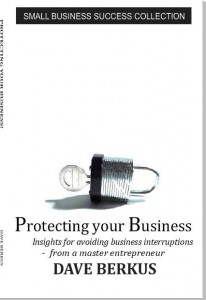You’ve heard the old one – that a banker always seems willing to offer a loan when you don’t need it. For small businesses, there is such truth in that statement that you can trust the story to be based in reality from experience.
There are great exceptions for growing businesses and for businesses that have a track record with a banker. Working capital loans and lines of credit are needed for growth and during times of business stress. If a business were operating above breakeven and revenues and expenses steady, profits would flow to either the shareholders’ pockets or to working capital and taxes. Each cycle gives the CEO a chance to use those profits to some positive advantage, including increasing the marketing budget, paying down loans, building working capital, increasing “sticky cash” balances or paying shareholders.
[Email readers, continue here…] But if a good business finds itself in a bad downturn, there may be a need that did not exist before for temporary cash, even as management reacts and moves to trim fixed overhead.
 Approaching a banker during such times tests relationships. If there was no previous relationship, few bankers would rely upon anything but a personal guarantee backed by hard assets before considering a loan. But for those wise executives who included their bankers in occasional update calls, press releases, invitations to company events and an occasional personal visit, the strength of the relationship will often show its benefits during times when lending rules of the bank are near the “can’t do it” point.
Approaching a banker during such times tests relationships. If there was no previous relationship, few bankers would rely upon anything but a personal guarantee backed by hard assets before considering a loan. But for those wise executives who included their bankers in occasional update calls, press releases, invitations to company events and an occasional personal visit, the strength of the relationship will often show its benefits during times when lending rules of the bank are near the “can’t do it” point.
For those with existing bank loans, that constant attention is more than just important. As loan covenants become closer to being violated or after such an event, bankers have some latitude in deciding how to handle their accounts. Upon discovery without prior notice or updates, bankers sometimes turn the company over to the bank’s workout group – a place you never want to visit. In the gray area where covenants are broken but barely, covenants can be waived for a period of time as companies rectify the problems, all based upon the quality of the relationship between banker and client.
It is during those challenging times that it is most difficult to tell the story to your banker, but just then the most important of times.

Very sound advice and I have seen others follow it to good effect. Much also depends on the bank. My personal experience is that banks often change the rules without giving you prior notice, and move people around so much that it can be difficult to maintain a key contact.
Dave,
As Michael O’Daniel’s note implies, one of the things high growth rate firms should do is to assess banks and bankers on the stability of of account managers.
As for workout groups there are two classes, those whose mandate and reward structure are to work you out of business and whose remunderation is a proportion of the amount recovered. The second group whose mandate is to provide the special attention a volatile situation requires. Their mandate includes the ability to waive covenants and are to avoid increasing your financial interest costs as low as possible but charge fees for service. Their mandate is to return you to the branch network as a profitable customer. The key to the difference between mandates is whether or not your loan has been written off. Your past relationship with the branch account manager can determine where you end up within a workout group.
Your advice is EXCELLENT!
I wish I had your advice and counsel when I started my first medical company. Keeping your banker updated is crucial to getting through the hard times and
we all have hard times sooner or later.
Keep up the great work, we are all better managers because of your work.
Many years ago Paul Desmond, the noted alto saxophonist some of you may remember from his days with the Dave Brubeck Quartet, was bemoaning the fact that a girlfriend was about to leave him for someone in the financial services industry. Apparently she had told him that he was whimsical and she enjoyed his company, but she felt the other relationship offered her more stability.
“So that’s the way it ends, then,” said Paul. “Not with a whim, but a banker.”